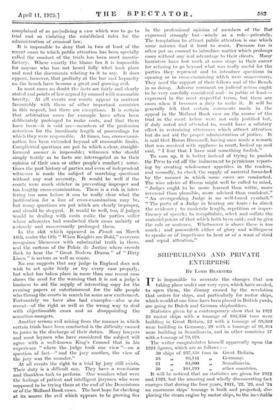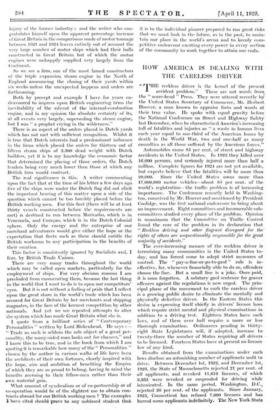SHIPBUILDING AND PRIVATE ENTERPRISE
BY LORD BEARSTRD
IT is impossible to overrate the changes that are taking place under our very eyes, which have needed, to open them, the dismay caused by the revelation that orders for ships, and particularly for motor ships, which would at one time have been placed in British yards, are going to Dutch and German shipbuilders.
Statistics given by a contemporary show that in 1921 28 motor ships with a tonnage of 102,356 tons were building in Great Britain, 22 with a tonnage of 33,333 were building in Germany, 29 with a tonnage of 91,494 were building in Scandinavia, and in other countries 57 with a tonnage of 79,459.
The writer congratulates himself apparently upon the 1924 figures, which are as follows :- 50 ships of 237,458 tons in Great Britain.
28 1, 96,141 If Germany.
21 64,000
DP
Scandinavia.
50
91,
104,199
2,
other countries.
It will be noticed that no statistics are given for 1922 and 1923, but the amazing and wholly disconcerting fact emerges that during the four years, 1921, '22, '23, and '24 an enormous ships' tonnage is built and projected, dis- placing the steam engine by motor ships, to the inevitable injury of the former industry ; and the writer who con- gratulates himself upon the apparent percentage increase of Great Britain in the comparisons made of motor tonnage between 1921 and 1924 leaves entirely out of account the very large number of motor ships which had their hulls constructed in Great Britain but of which the motor engines were unhappily supplied very largely from the Continent.
So we see a firm, one of the most famed constructors of the triple expansion steam engine in the North of England announcing the closing of their yards within six weeks unless the unexpected happens and orders are forthcoming.
Both by precept and example I have for years en- deavoured to impress upon British engineering firms the inevitability of the advent of the internal-combustion engine, and in my opinion the absolute certainty of its, at all events very largely, superseding the steam engine, but I was " a prophet crying in the wilderness."
There is an aspect of the orders placed in Dutch yards which has not met with sufficient recognition. Whilst it is true that Dutch interests had a predominant influence in the firms which placed the orders for thirteen out of fifteen steam ships of 2,300 dead weight with Dutch builders, yet it is to my knowledge the economic factor that determined the placing of those orders, the Dutch tenders being very much lower than those at which any British firm would contract.
The real significance is this. A writer commenting upon the fact that at the time of his letter a few days ago five of the ships were under the Dutch flag did not elicit the important bearing of this matter upon a side of the question which cannot be too forcibly placed before the British working men. For this fleet (there will be at least thirty vessels constructed before the requirements are met) is destined to run between Maricaibo, which is in Venezuela, and Curacao, which is in the Dutch Colonial sphere. Only the, energy and the enterprise of our merchant adventurers would give either the hope or the expectation that fleets such as these should entitle the British workman to any participation in the benefits of their creation.
This factor is consistently ignored by Socialists and, I fear, by British Trade Unions.
There are very many trades throughout the world which may be called open markets, particularly for the employment' of ships. For very obvious reasons I am precluded from enumerating them, because the last thing in the world that I want to do is to open our competitors' eyes. But it is not without a feeling of pride that I reflect upon the great 'share in the world's trade which has been secured for Great Britain by her merchants and shipping Magnates, in the face of the keenest competition by other nationals. And yet we see repeated attempts to alter the system which has made Great Britain what she is.
I quote from a brilliant series of " Contemporary Personalities " written by Lord Birkenhead. He says :-- " Trade as such is seldom the sole object of a great per- sonality, the many-sided man looks out for chances," and I know this to be true, and in the book from which I am quoting it is remarkable how many of the " Personalities " chosen by the author in various walks of life have been the architects of their own fortunes, clearly inspired with the hope, aim and ambition of benefiting the Empire of which they are so proud to belong, having in mind the benefits' accruing to their fellow-men rather than their own material gain.
What amount of syndicalism or of co-partnership or of co-operation would be of the slightest use to obtain con- tracts abroad for our British working men ? The examples I-have 'Cited should-prove to.- any unbiased student that• it is to the individual pioneer prepared to run great risks . that we must look in the future, as in the past, to main- tain our place in the world's arena and to keenly com- petitive endeavour exerting every power in every section of the community to work together to attain our ends.











































 Previous page
Previous page